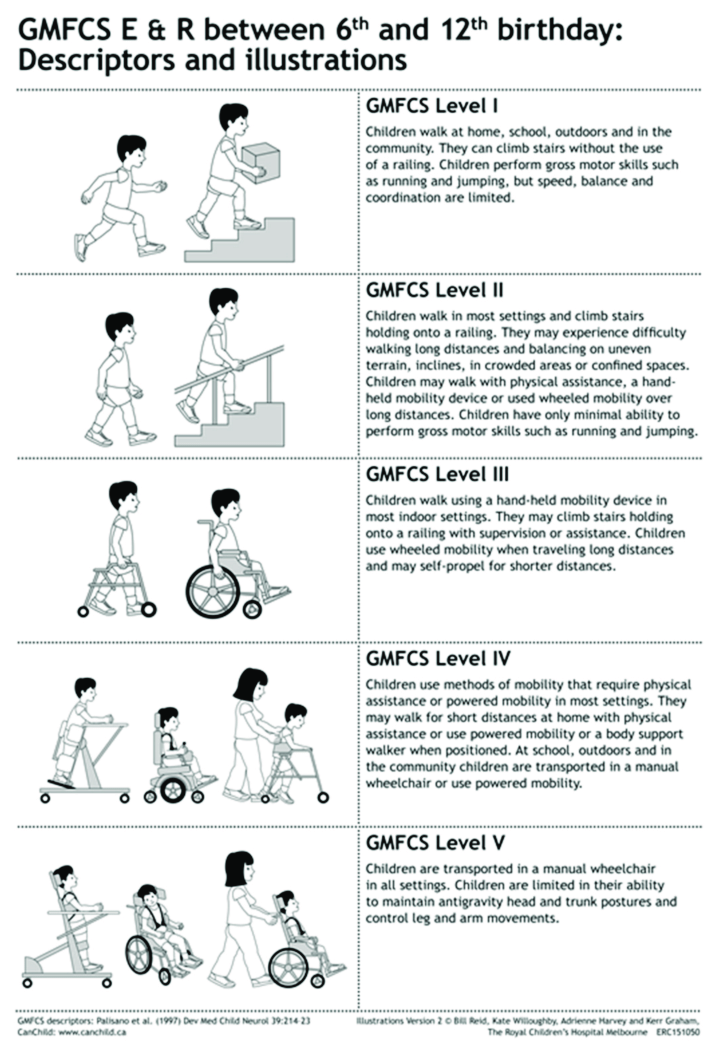Cerebral Palsy GMFCS I-III

What is GMFCS I-III?
This is a universal way of describing a child’s functional ability following diagnosis of cerebral palsy. GMFCS stands for Gross Motor Function Classification System I-III.

Resource: researchgate.net
Cerebral Palsy Integrated Pathway (South East)
If your child has a diagnosis of cerebral palsy, they will have a regular formal review of their range of movement to monitor any changes. The results of this assessment will be shared with you.
You can find out more about the Cerebral Palsy Integrated Pathway and assessment at CPIP UK - information for parents.
Purpose: Why do we have this pathway?
Working together our therapy colleagues we provide assessment, advice and some treatments that are tailored to your child’s needs. This will vary from child to child. Some may need focus on their skills for moving around their home and school, some may need support with their everyday activities and some may not have any needs at all. There might be times when we need to have more input, for example when your child transitions from primary to secondary school.
What do we do?
Our work is focussed on maximising your child’s potential and helping you, your family and school staff to support them achieving their goals. We work in partnership with you, to incorporate our advice into your child’s every day activities.
Assessment: This may involve observing your child in their home, a clinic setting or their school to help understand their individual needs.
Advice: Our advice may include signposting to other services in the community, practical information to optimise your child’s ability to participate and guidance to help stay as safe and active as possible. This may include how to create an inclusive PE session in school for your child.
Some treatments: This may involve joint working with many other professionals and might include exercise programmes and provision of equipment that improves your child’s function
Who may be involved with your child?
These core services will be involved and are usually responsible for referring your child to our service:
- nurseries and schools
- your family doctor
- health visitor and school nurse
- audiology (newborn)
Your child may also have input from:
- early years service
- physiotherapy and occupational therapy, speech and language therapists and assistants
- private sector
- voluntary sector
- orthotics
- community paediatrician
- specialist centres
- wheelchair services.
Relevant resources that may be useful
- Canchild: www.canchild.ca Internationally recognised information website for children with cerebral palsy and their families
- Ages and Stages: www.agesandstages.com National website providing information and screening tools for development for early educators and healthcare professionals
- Cerebra: www.cerebra.org.uk National charity for children with brain conditions and their families.Discover a better life together – offering advice and support
- Children’s Today Charitable Trust: www.childrentoday.org.uk Charity that raises funds to provide specialist equipment and services for children and young people with disabilities
- Disability Sport liaise directly with a therapist for local and up-to-date resources.
- Hemihelp: www.contact.org.uk provide specialist advice and support for families and their children with hemiplegia
- The Caudwell Charitable Trust: www.caudwellchildren.com Charity that helps disabled children reach their full potential through practical and emotional support
- Scope: www.scope.org.uk National charity campaign to challenge and change negative attitudes about disability and provide direct services
- Re Map: www.remap.org.uk Custom-made equipment to help disabled people live more independent lives.
- Whizz Kidz: www.whizz-kidz.org.uk National charity providing a range of services (including work placements and wheelchair skills) for young wheelchair users
Children's Integrated Therapy Service
Speak to the team for
more information.
Case studies
Jack was eight-years-old when we first met him when he moved to East Sussex.
He was referred by the therapy team where he used to live. Jack was referred because he was experiencing frequent trips and falls, and needed support because he was getting very tired. He was already known to a community paediatrician and had a diagnosis of cerebral palsy that affected one side of his body.
When we met him he was frustrated, tired and had variable energy levels. Jack found walking upstairs and moving around in busy environments difficult. He was active and enjoyed gymnastics, swimming and could walk for 20 minutes before needing his wheelchair. He attended the local primary school.
What did we do?
One of our physiotherapists assessed Jack and this revealed the specific areas of weakness on one side of his body. He also had a difference in leg length which was affecting his balance. He was frustrated because he was unable to join in with his new friends in PE lessons at school.
Physiotherapy referred Jack to the orthotist who arranged a tailored shoe raise. He was referred to wheelchair services, provided and taught an exercise programme. The physiotherapist knew we could meet Jack’s goals more effectively working in collaboration with the occupational therapist. Our therapy team now review him regularly in a joint working clinic to progress his goals and activities, supporting Jack, his family and his school along the way.
Jack now has improved balance in his everyday activities. His school is implementing advice successfully, allowing him to pace his school day and take part in appropriately adapted PE lessons with his friends. Jack’s parents report he is more settled and happy at school. Jack reports feeling more confident when playing with his friends in the playground where he falls less often. He also feels he has more energy at the end of his school day to play with his new puppy.
Give feedback
Have you used our services and want to give your views?
Kent Community Health NHS Foundation Trust
Local stakeholders
- Contact our Children's Integrated Therapy Service
- Contact our School Health Service
- Support services in East Sussex
